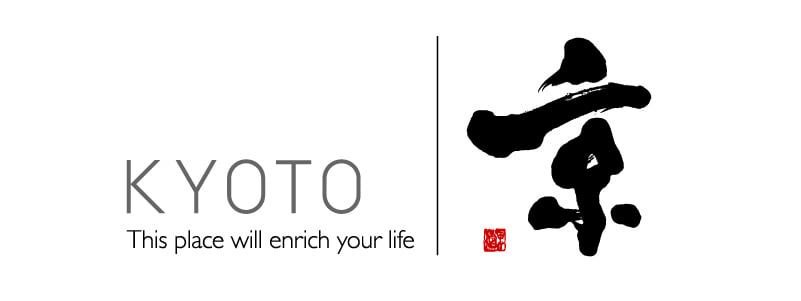Seek out some of the best autumn foliage in the temples of Kyoto Prefecture
Time required : 2 days
- Japanese Culture
- Outdoor
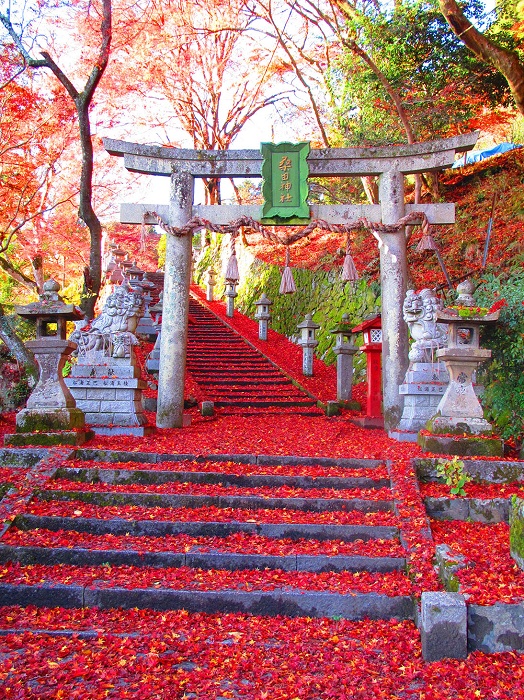
The perfect course to get away from it all and discover the enchanting variety of colors of autumn foliage in Kyoto. This course will take you through some of the shrines and temples in Kyoto's Tea Country and Woodland regions with some of the most spectacular displays of colorful leaves. On day two, enjoy a charming ride through the valley on the Sagano Romantic Train to one of Kyoto's famous autumn sights in Arashiyama.
Day 1
JR Osaka Station
36 minutes by train
Iwashimizu Hachimangu Station
3 minutes walk
Cable Hachimangu-guchi Station
3 minutes by train
1Iwashimizu Hachimangu Shrine
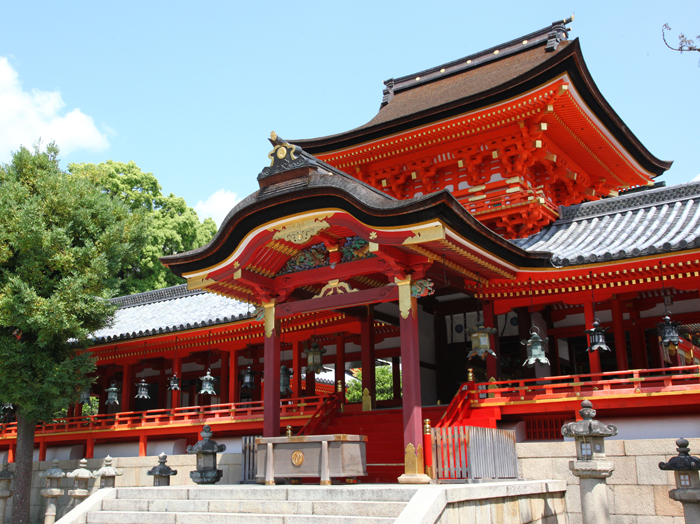
One of the three main shrines bearing the name Hachimangu, Iwashimizu Hachimangu Shrine was dedicated to a god for the protection of the nation in 860. After the main shrine was restored by Oda Nobunaga and its cloister rebuilt by Toyotomi Hideyoshi, Tokugawa Iemitsu built an additional ten shrine buildings in 1634, all of which are a part of this National Treasure.
- Tel
- 075-981-3001
- Address
- 30 Yawata-takabo, Yawata City, Kyoto Prefecture
- Access
- Train: From Iwashimizu Hachimangu Station on the Keihan Line, take the cable car to the shrine from Hachimangu-guchi Station to Hachimangu Sanjo Station and walk for 5 minutes.
Car: 20 minutes from Kumiyama-Yodo
20 minutes walk
2Zenporitsu-ji Temple (Maple Temple)
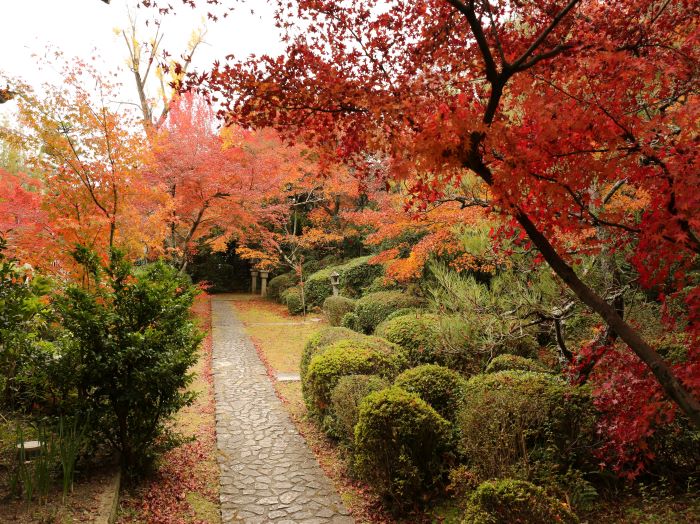
Zenporitsu-ji Temple, located in the southeast of Iwashimizu Hachimangu Shrine in Yawata City, Kyoto, was donated by Zenpoujikyusei, the officer of Iwashimizu Hachimangu Shrine, in 1257 as a dormitory for the monks. Jissou-Shonin, a master from Todai-ji Temple in Nara, was invited to be the founder of the temple. It is said that Ryoko, the great-granddaughter of Zenpoujikyusei, married Ashikaga Yoshiakira and gave birth to the third generation Shogun Ashikaga Yoshimitsu, and was deeply tied to the Muromachi Shogun family. Many maple trees (momiji) donated by Ryoko are planted in the gardens, and in autumn, nearly 100 maple trees turn red, creating beautiful scenery that has earned the temple the name of “Momiji Temple.” The main hall and the front gate are designated as cultural assets of Kyoto Prefecture. In addition, the temple has a total of 9 designated cultural assets of Yawata City, such as its seated statue of Amida Buddha (Amida Nyorai) with jewel crown and the seated statue of the Yawata Buddhist monk (Reservations are required for visits of the interior of the main hall).
- Tel
- 075-981-0157
- Address
- 88-1 Yawata Baba, Yawata City, Kyoto Prefecture
- Access
- Train: Get off at Keihan Iwashimizu Hachimangu Station and walk for 15 minutes.
Bus: Take Keihan bus from Keihan Iwashimizu Hachimangu Station, get off at Hashiagari bust stop and walk for 5 minutes.
Car: Take Meishin Expressway, get off at the Oyamazaki Interchange, and drive for 10 minutes. Alternatively, take the Keiji Bypass, get off at Kumiyamayodo Interchange, and continue for 10 minutes.
15 minutes walk
Iwashimizu Hachimangu Station
30 minutes by train
Uji Station (Keihan)
15 minutes walk
3Kosho-ji Temple
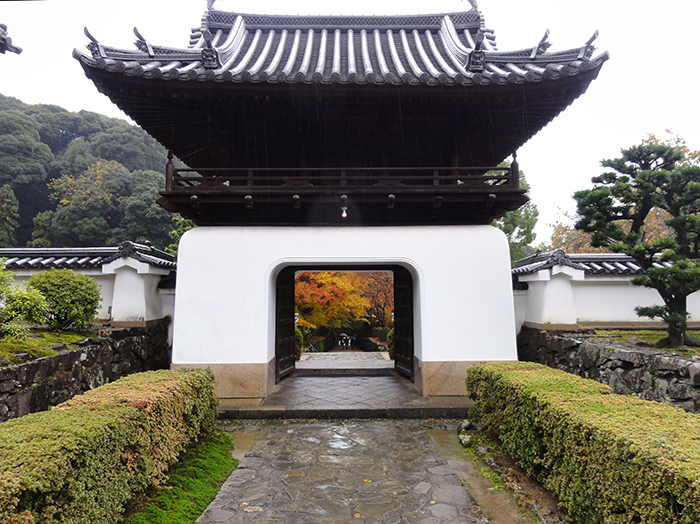
This temple of the Soto Zen school of Buddhism was a training hall opened in Fukakusa (Fushimi) by the Buddhist monk Dogen in the Kamakura Period (1192-1333). It was later reconstructed in 1648 by Lord Nagai Naomasa of Yodo Castle, using the remains of Fushimi Castle. Highlights amongst the seven structures in the temple grouds include the Kotozaka, the approach to the temple that forms a tunnel of fall foliage in autumn; the temple gate made in the Ryugu-zukuri architectural style; “nightingale” hallway floors that squeak to alert those within of intruders; the Tenarai Kannon bodhisattva as mentioned in the classic "The Tale of Genji"; and chitenjo ceilings.
- Tel
- 0774-21-2040
- Address
- 27-1 Uji-yamada, Uji City, Kyoto Prefecture
- Access
- Train : Keihan Uji Line / Uji Station / Walk / 10 min
Car : Keiji By-pass Uji-nishi IC / 10 min
Uji
Day 2
JR Uji Station
45 minutes by train
Umahori Station
15 minutes walk
4Kuwata-jinja Shrine
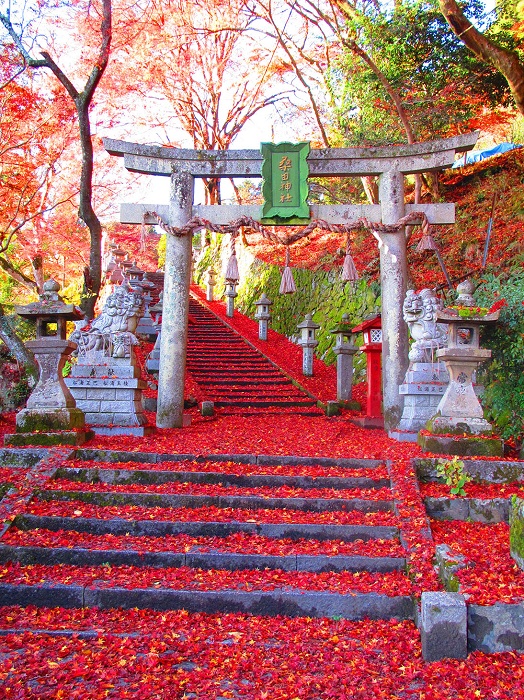
Kuwata-jinja Shrine in located in Yamamoto, Kameoka City, Kyoto Prefecture. It was listed in the government's official compliation of shrines, the "Engi-shiki Jinmyo-cho," and it was formerly ranked as a "village shrine." The mountainside behind Kuwata-jinja Shrine, which stretches to the entrance to the Hozukyo Gorge, is covered in an forest of evergreen beeches and oaks, which, together with the Hozu-gawa River flowing below, makes for some marvelously soothing scenery.
- Tel
- 0771-25-3881
- Address
- 5 Yamamoto Kitajo, Shino-cho, Kameoka City, Kyoto Prefecture
- Access
- Approx. 15 minute walk from Umahori Station on the JR Sagano Line
7 minutes walk
Torokko Kameoka Station
5Sagano Romantic Train
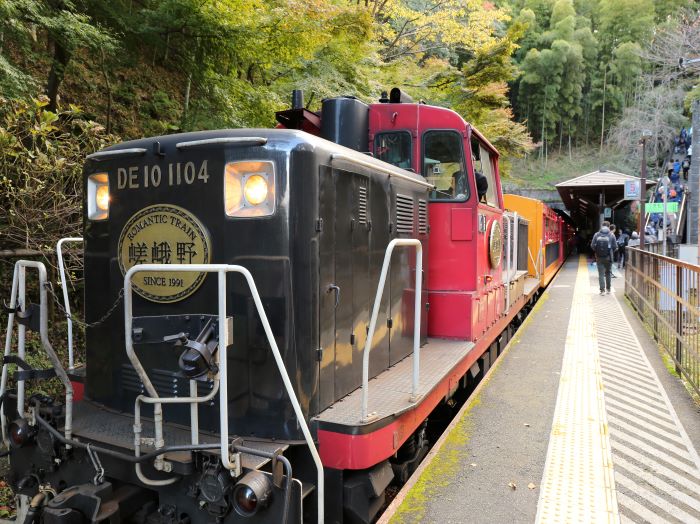
The Sagano Romantic Train is a sightseeing train that uses the old Sanin train line. From Torokko Saga Station to Torokko Kameoka Station, the train covers 7.3 kilometers in about 25 minutes, with mountain cherry blossoms and fresh green in the springtime, the voices of cicadas and the sound of the rain and river in the summer, brilliant autumn leaves in the fall, and snowy scenery in the winter—perfect for taking in the best of the seasonal scenery along the Hozukyo Gorge.
- Access
- Torokko Saga Station:
Just outside Saga-Arashiyama Station on the JR Sagano Line
Torokko Kameoka Station:
10 minutes walk from Umahori Station on the JR Sagano Line
30 minutes by train
Arashiyama
